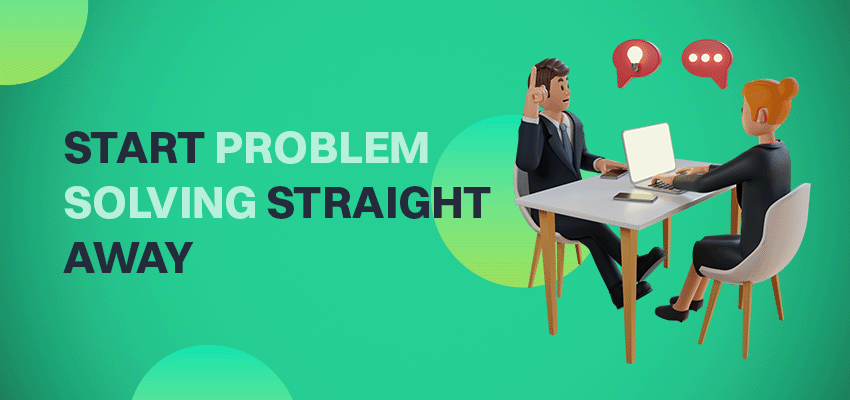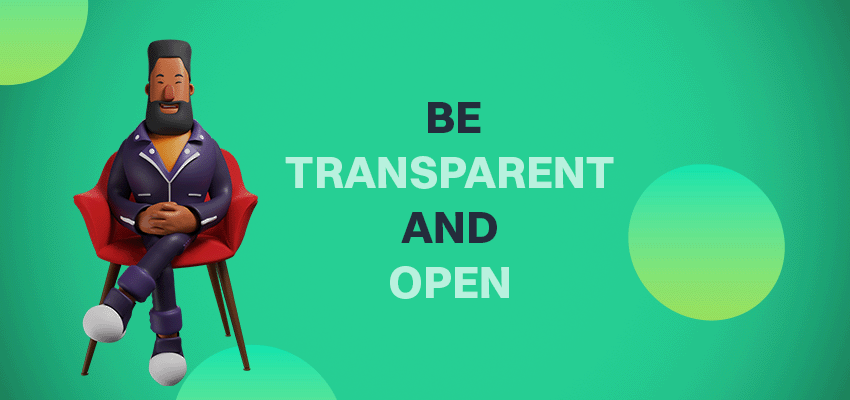Nailing your next job interview might be stressful. Business applications were down 40% in early 2020, and the 2.9M jobs created by startups each year probably won’t materialize. And while some European startups are going against the grain and hiring, the fact is that entering a new company can be more challenging than ever these days. This is why you have to be more thoughtful than ever about your next job interview.

Common Practices Do Apply
The word startup might conjure up images of huge open-plan offices with relaxed developers wandering about, playing table tennis and eating breakfast cereals. But no matter how casual the environment is, don’t ever forget that a startup is nonetheless a business.
No matter how much of a moonshot their next project is, or whether the job application mentioned dreamers and rockstars, you still have to be super professional when attending a job interview at a startup.
Show who you truly are!
The same qualities that apply in a corporate environment are also valued within startups. That means you should follow the standard practices for what is considered a good interviewee, namely:
- Do your research: nobody wants to hire someone who has no idea about what the company does. Before your job interview, look for any information you can find online about the company. Try to make notes of their recent achievements, go over their social media pages, and generally try to show that you’ve done your homework. This might include competitor analysis and how you can help the company succeed.
- Be confident about your resume: this is a point that many candidates misunderstand. What if I don’t have the right experience? What if I’m just out of university? Or there’s a big gap in my career history? It doesn’t matter as long as you are aware of it all and ready to explain it at the job interview. If you’ve already made it through the door, you’re allowed to tell your story. Make sure it aligns with the one found on your CV.
- Prepare questions: an interview is a two-way street. The company will want to learn more about you, but it’s also an opportunity for you to clarify any doubts you might have. You can ask about the company culture, some policies that weren’t mentioned in the job post, or about very specific topics, like which software they use the most daily. One tip that always works: ask questions about the interviewer. How long have they worked at the company? How did they first hear about it? This brings us nicely to our next point… If you need more ideas for questions here you have it.
- Be ready for small talk: no interviewer will get right down to business. Every job interview is a chance to understand yourself as a person. The business world is based on relationships as much as talent, and showing that you’re easy to get along with can give you a competitive advantage. Because hiring is just as much about cultural fit and social intelligence as anything else. And some people are indeed better at small talk than others. So those who feel less confident can study online videos about projecting charisma and influencing people, but the key point is to not be surprised or lost for words when you’re asked how easy you found it to locate the building, for instance.
- Use the STAR method: this method is used in job interviews for you to highlight some of your career successes. S stands for Situation, where you describe the challenge you faced. T is for the Task you had to accomplish. A is for the Action you took. And R is for the Result. Nice and easy to remember! Use the method to showcase your competencies in relevant job scenarios that you succeeded in to persuade the interviewer that you are the right one for the job. It allows you to go beyond a written profile black-on-white to a profile that knows how to make him/herself adaptable and applicable to the given job role.
- Don’t forget to follow up: this is often forgotten these days. But even if you think you’ve blown your job interview, it’s never a bad idea to send a quick message the next day. A simple thank you for their time could make a difference! Chances are, the interviewer saw dozens of people that day, and just reminding them that you exist could help your chances.
And then, of course, there’s all the stuff you probably already know about body language, first impressions, dress code, etc… But to be fully honest, we’re a bit hesitant to make you focus too much on that, especially when it comes to interviewing for startups. This is because, as we’ll see, transparency and honesty can be strong advantages in that world.
Advice Specific for Startup Interviews
This is where things get interesting. Because there are as many job interview styles as there are startups. You might have heard of people head-hunted by tech companies and hired on the spot after an impressive achievement. Or Google’s famously tough interview questions.
Still, there are enough patterns we’ve found from studying startup job interview questions. Here’s what we believe you should understand:

Startups tend to move fast. They don’t have the luxury of 6-week onboarding programmes or lengthy Learning and Development courses. This is why you have to know exactly what the company’s challenges are, and how you will solve them. You must know where you fit in, and why you’re the best person for the job.
Remember when we mentioned doing your research about the company above? This is exactly where a good understanding of what the startup does will help you. You’re not joining it so that they can help you with your career. You’ll be hired if you can demonstrate that you’ll help them meet their goals. In some cases, an interviewer might mention a given situation the company is finding itself in and therefore why they might be hiring. This is your first chance at the job interview to orally accommodate their need with your skills and knowledge.
Pro tip: have a day-one plan or a list of things you’d start doing at the company straight away. This shows you won’t need babysitting and can demonstrate initiative. Everyone loves a proactive role player on their team.
Have Strong Thoughts About the Product
You might have heard of the term PLG or product-led growth. It doesn’t matter if the product is Facebook, a subscription service, or a portable 3D Printer. In the startup world, the product is the most important thing, and your goal, as an employee, will be to improve it.
This is to say, the very least you must do before you attend your job interview is to test the product. And on top of that, remember that the MVP model (minimum viable product), means startups launch products they know aren’t perfect yet. What does it say about you if you’re asked about it at the job interview, and all you can say is that you like it?
In short, you have to think beyond a simple user, and effectively be more like a consultant. What are the product’s strengths and weaknesses? Is there anything you’ll start working on to improve it right away? A UX issue you couldn’t work out? Suggestions for their social media marketing? Once again: you have to act like you’re already part of the company, not just someone hired by it.
Pro tip: Before the job interview, record your experience using the product and make a list of all the pros and cons you can think of.

In the startup world, employees tend to wear many hats. So yes, being a jack of all trades can be beneficial, but it’s also important to be open about what you can’t do. In fact, interviewers will favour those who can demonstrate a strong sense of their worth in specific areas.
Let’s take an example. You’re postulating for a data science position. The interviewer asks if you’d be comfortable helping marketing with some ideas. If you don’t have any background in that area, it’s much more valuable for the company to know how they can’t use your skills. You should be open and say that it wouldn’t be a worthy ROI when someone else could do it better and faster.
Transparency tends to be at the core of many startups. Your self-assessment should align with that code of ethics too (without underselling yourself).
Pro tip: Before the job interview, go over the job description once more, and rank how confident you feel about each of the requirements. Don’t hesitate to mention the one you’re the least comfortable with during the job interview, as long as it doesn’t distract from the one you’re passionate about!
Over Deliver
If the initial interview goes well, there could still be a probation period. Don’t think for one second that your foot is already in the door because it’s your chance to show how committed you are to the job.
And bonus points if you can use that stage to bring something nobody else can to the table. In business, you might hear the USP (unique selling point). If your skills crossover with another department’s, it’s the perfect opportunity that you can go above and beyond.
Pro tip: if you’re given any kind of homework with deadlines or KPIs, try your best to surpass the company’s expectations.

This is a trick question startup interviewers often rely on. They want to get a better idea of who you are as a person, and may ask you to talk about something completely irrelevant.
There are two goals here: first, see how good you are at thinking on your feet. To see if you can adapt after a curveball, which happens all the time in a startup environment.
Where does your passion live?
Secondly, they want to see if the passion you feel about other things is as strong as how you feel about the company. A candidate who has nothing to say about the company’s products and a lot to say about a competitor will sayonara away. On the flip side, if your passion projects can be used by the company, you’re drastically increasing your chances.
Pro tip: Before the job interview, prepare a mental list of your passion projects and what you find thrilling about them. Bonus points if they align with what the company does!
Bonus Round: Tips For Online Interviews
Since these are becoming more common these days, we thought we’ll make a quick list of things to consider for virtual meetings:
- Make sure the space is adequate: no loud external noises, good lighting, and a strong internet connection are all must-haves. Attention to detail is easy to notice as an interviewer. Seriously, it takes 10-15 minutes pre-interview to make sure everything looks clean & tidy and to set up some solid lighting. This will do the trick.
- Practice your tech setup: make sure you’re using the right app and practice calling a friend beforehand. Test your microphone and headphones, and ideally, have extras nearby.
- Look at the webcam, not the interviewer: this one is absurd, but it helps to recreate a sense that you’re meeting the person in real life. The only way to see eye to eye with the interviewer is to pretend they’re talking from your webcam!
- Be prepared for things to go wrong: a housemate or child might knock on the door. A street musician might start playing the trumpet outside. A plane may fly overhead. The interviewer will understand, but be prepared to apologize in advance and clarify the situation before the job interview begins.
Key Takeaways
On the surface, nailing a job interview isn’t all that much different whether you apply at a startup or a more established company. One of the key points is to research the company and their competitors.
But there is still certain mannerism worth considering. Startups value company culture and strong ethical codes. They move fast and need results immediately. They’re less interested in providing you with a career than optimizing their product.
While it can be overwhelming at first, hopefully, these tricks will help you feel prepared, comfortable, and ready to nail that next job interview. Now go get ’em!
